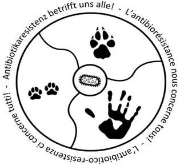Bacteria can be transmitted between humans and animals, and some are resistant to antibiotics. What can veterinary clinics and practices do to minimise the transmission of multidrug-resistant bacteria? Researchers at the Vetsuisse Faculty set out to answer this question.

A study funded by the FSVO found multidrug-resistant bacteria in dogs and cats, the animals’ owners, and the staff of veterinary clinics and practices. Multidrug-resistant bacteria are resistant to multiple antibiotics and are therefore more difficult to treat.
With the aim of minimising transmission of such bacteria, specific hygiene recommendations were drawn up for veterinary clinics and practices. The participants in this project were the Vetsuisse Faculties in Zurich and Bern, the Swiss Veterinary Society and the FSVO.

Importance of hygiene
Resistance to antibiotics is on the rise. Every use of antibiotics can encourage resistance, so it is important to use antibiotics as sparingly as possible.
This calls for effective measures to prevent diseases and minimise their transmission. Hygiene plays a crucial role here: good hygiene can prevent infections and is important in both human and veterinary medicine.
Research into the transmission of bacteria
To maintain effective hygiene, we need to know where bacteria occur and how we can combat their transmission. Just like at home, it is important to maintain good hand hygiene in veterinary clinics and practices.
Transmission of bacteria between pets and humans is rare, but it does occur. There has been little research into the prevalence of resistant bacteria in pets in Switzerland. To investigate this, samples were taken in veterinary clinics and practices and subjected to tests. The researchers found multidrug-resistant bacteria in both the samples from clinic staff and those from animals and their owners. Some of these bacteria were closely related, which is why transmission was assumed. Transmission can occur directly between animals and humans or indirectly, via the environment.
Measures to combat the spread of bacteria
Based on the results of the research project into the spread and transmission of multidrug-resistant bacteria, a comprehensive hygiene manual (available in German or French) was produced for small animal practices and clinics. The manual contains specific recommendations to minimise the spread of bacteria. These include good personal hygiene, proper cleaning and disinfection of premises and equipment, and optimal surgical management (see “More information” > “Details”).
A future research project will look at whether and how the recommendations are implemented in practice. For example, digital learning and self-evaluation tools could be developed and minimum statutory requirements put in place at a later stage.
More information
Last modification 14.06.2022




